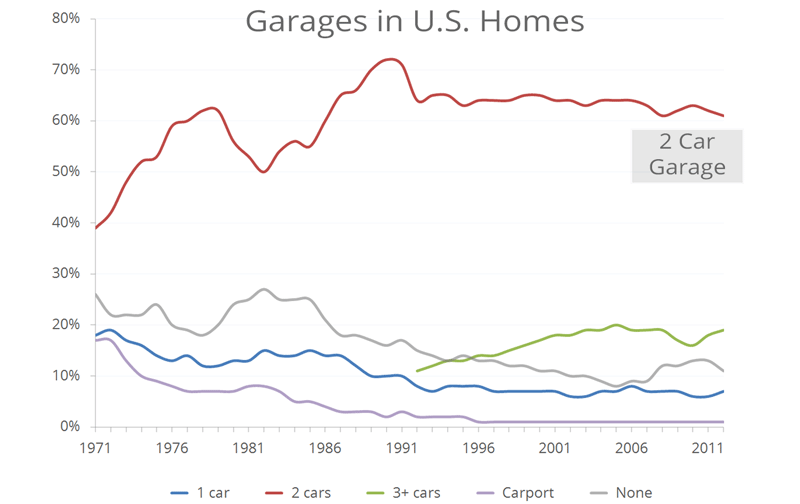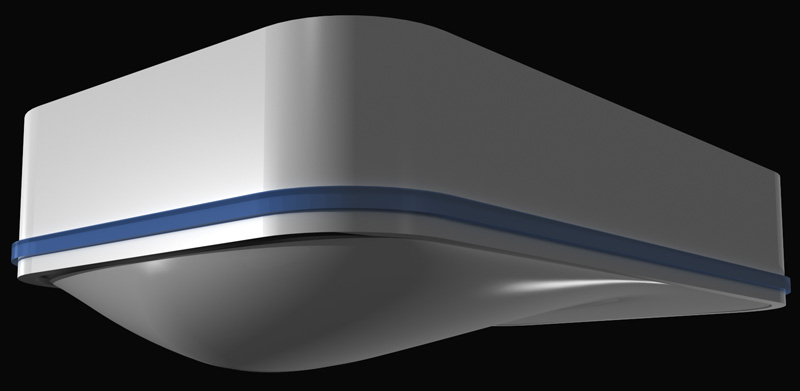
I own a garage door opener. It works most of the time.
It doesn’t know me, but I try to take care of it from time to time. I lubricate the threaded steel rod when it gets too loud. I even soldered a new LED to its remote when the old one broke off.
Maybe someday my garage will know my name and try to take care of me.
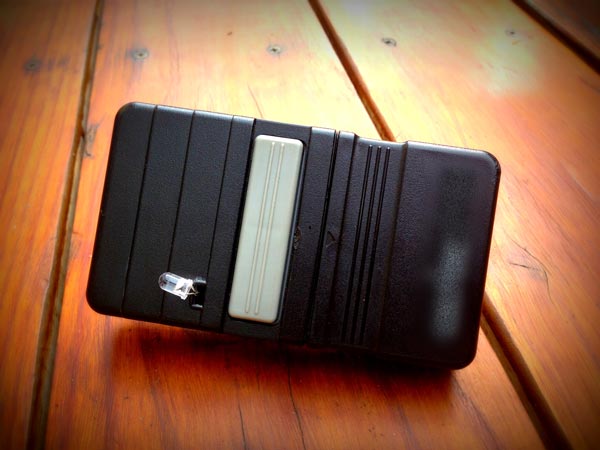
From French garer (to shelter, to park)
Ultimately from Old Norse (to protect)
First known use in 1902
Details
Note: This includes carports
Details
This is my rough estimate based on:
- the number of new homes each year (483K)
- the average number of garage door openers needed per home (est. coefficient of 1.5)
- an estimated mix of 25% go to new homes and 75% to replacing old units in existing homes
total = 4(1.5 * 483,000)
This is inline with this reference of 3M units sold each year
Details
This is my estimate based on:
- 3M units sold annually
- ASP of $140 (my estimate based on looking at the street price of numerous offerings)
total = 3,000,000 * $140
Most U.S. homes have a 2-car garage
It’s most commonly used for storage, then parking
Top 3 answers
Space left for parking
And clutter often pushes a car out to the curb
Don't have room to park cars in 2-car garage
Only have room for one car in 2-car garage
Details
Source: 2012 UCLA Study
Published in Life at Home in the Twenty-First Century: 32 Families Open Their Doors
The 25%/32% is also cited all over the Internet and attributed to a U.S. Department of Energy study that I could not locate. Regardless, a quick empirical study of my own neighborhood showed similar results.
The main garage improvement people want is help cleaning it up
Top 3 answers
Details
Source: Home Innovations Research Labs, 2013
Also, according to a 2012 study by the National Association of Home Builders, 32% of home buyers stated that garage storage was essential to the purchase decision
Also, most garage “users” are male
Male
Garage Technology Timeline

Details
Some References:
- Gareth Marples: The History of Garage Doors – The Search for the Perfect Carriage House
- Wikipedia: The Garage Door Opener
- Wikipedia: The Garage Door
- Wikipedia: Timeline of United States inventions (1890–1945)
- “Widely Separated Inventors Invent Garage Door Openers By Radio Impulses”. Popular Science: 32. February 1931.
Goals
Create a detailed concept of a smart garage system that is:
It’s focused on helping me in the ways I actually use my garage
It’s smart enough to make my life easier
It knows me, helps me and makes me smile
Constraints

Rick
Lives with his family in a single family home with a 2-car garage.
On weekdays he's at work, but on the weekends you'll often find him building furniture in the garage.

Cindi
Between errands and carpools, feels she is always in and out of the house.
Thinks the garage is a staging ground where things go before they're given away.

Lauren
Spends most of her time with friends at school or on her phone.
Can't drive yet, but is learning.
The following tables are a list of prioritized user stories, organized by the level of seamlessness the design for that experience must have.
| 1. Garage Access | |
|---|---|
| SEAMLESS | |
| DESCRIPTION | EXAMPLE |
| Car leaving/returning | Going to work; Grocery errand; Motorcycle (wearing gloves) |
| Check Garage Door Status | Is the garage door open? |
| SOLID | |
| Non-Car Entry | Child home from school by bus or walking; family going on walk or bike ride |
| Friend Entry | Neighbor needs to borrow a tool from the garage while you’re away; Friend needs to get into house because he forgot his phone there |
| Parking the Car | Am I far enough in to close the garage door? |
| Trusted Friend Authorization | Brother drove into town for the week and will need to come and go |
| CONSIDERED | |
| Monitoring the Other Doors to the Garage | Side door; Door between house and garage; |
| 2. Garage Storage | |
|---|---|
| SEAMLESS | |
| DESCRIPTION | EXAMPLE |
| Finding Stuff | Where is…? Do we have any more…? Did I put that in the garage or the attic? |
| SOLID | |
| Storing Stuff | Holiday decorations; Sports equipment |
| CONSIDERED | |
| Remembering to clean or restock storage | Emergency kit; Food storage |
| 3. Workspace | |
|---|---|
| SOLID | |
| DESCRIPTION | EXAMPLE |
| Extending Phone Capabilities | Listening to music; Siri commands; Conference calls |
| Remotely Communicate with Person in Garage | Tell him/her it is time to come in for dinner |
| CONSIDERED | |
| Documenting a Project | Photos and voice notes |
Installation Experience
 Since Rick did not buy the optional accessories, he felt comfortable installing the Smart Garage himself. Even though the packaging was made of an earth-friendly material, it still made him feel like he was opening an expensive computer: it didn’t feel like a router or IKEA package.
Since Rick did not buy the optional accessories, he felt comfortable installing the Smart Garage himself. Even though the packaging was made of an earth-friendly material, it still made him feel like he was opening an expensive computer: it didn’t feel like a router or IKEA package.
Rick never got confused when installing the Smart Garage because right on the front center of the package was a QR code that took him to the appropriate app store download page. The app immediately guided him through with short video instructions. It had him open the box and scan the large barcode on the inside (so he didn’t have to think about serial numbers, model numbers, etc.). It even knew which wifi network to bind to (though he had to enter the password).

The base station came with collapsible mounting brackets pre-attached, and connecting the power cables was simple. When he plugged in the power cable, a nice blue glow encircled the device, and a friendly female voice (not at all robotic like Siri) said:
“Well, hello there. It’s nice to meet someone who shares my good sense of quality and smarts. What’s your name?”
It must have known he spoke English by the settings on his phone–and it also must be aware of his phone because the same question was on his phone so he could type it out. But he decided to just answer her verbally. She picked it right up.
“Well, Rick, we’re going to be good friends. Now here is what we are going to do…”
And she proceeded to guide him through the full setup process, which ultimately felt more like talking to a friend who had already installed a Smart Garage before than to talking with a robot. In the end, he already felt like an expert, and he was excited to tell his friends and family about the whole thing.
Going Out
 Cindi is always in a hurry and the last thing she wants is wasted time. She is supposed to meet Rick and Lauren at the Giants game, but she is stuck at home waiting for her brother to come fix some wiring in the attic. Finally she decides to go, and as she enters the garage, the garage door starts to open and the Smart Garage greets her and tells her that she needs to be in San Francisco in 20 minutes, but with traffic it will take at least half an hour. As she drives away, the in-car app shows her that the garage is being closed and opens a map with directions to the stadium. While she was originally wary of the Smart Garage, it has actually been pretty helpful since she connected her phone and calendar to it.
Cindi is always in a hurry and the last thing she wants is wasted time. She is supposed to meet Rick and Lauren at the Giants game, but she is stuck at home waiting for her brother to come fix some wiring in the attic. Finally she decides to go, and as she enters the garage, the garage door starts to open and the Smart Garage greets her and tells her that she needs to be in San Francisco in 20 minutes, but with traffic it will take at least half an hour. As she drives away, the in-car app shows her that the garage is being closed and opens a map with directions to the stadium. While she was originally wary of the Smart Garage, it has actually been pretty helpful since she connected her phone and calendar to it.
Meanwhile, Rick is getting impatient and wondering where she is. He could text her, but he doesn’t want her texting while driving. So he opens the Smart Garage app, and he can see right away that she left 10 minutes ago. She’s going to be late.
A few minutes later, Cindi’s brother arrives to work on the wiring, but he’s locked out of their house. He’s glad Rick added him to their Smart Garage system; he just opens the app on his phone and opens the garage door. The door between the house and garage automatically unlocks, and the garage door closes behind him when he enters the house. Rick’s smartwatch buzzes with an alert; he likes to know when someone outside his immediate family opens the garage.
Working in the Garage
Coming Home
 Though he wouldn’t call it a “man-cave”, Rick really enjoys working in the garage. He used to wear headphones while working, but now that they have a Smart Garage, he listens to his playlists on his phone through the Smart Garage speakers. And ever since he connected his Facebook account, the Smart Garage learned that he likes the Giants and periodically gives him score updates.
Though he wouldn’t call it a “man-cave”, Rick really enjoys working in the garage. He used to wear headphones while working, but now that they have a Smart Garage, he listens to his playlists on his phone through the Smart Garage speakers. And ever since he connected his Facebook account, the Smart Garage learned that he likes the Giants and periodically gives him score updates.
Today he is reorganizing a few boxes, and so he decides to update the Smart Garage. It’s not that hard really, he just puts the box on the shelf, holds his smartphone near the box and taps a button. The Smart Garage asks him what’s is it that he just stored, and he speaks out the name of that box and gives a brief description of what’s in it. Last week he cataloged his whole garage in about 15 minutes. It was well worth it to him, because now Cindi and Lauren can find things in the garage without having to ask him where they are.
But, Rick has a tendency to get lost in his work, and his music fades as he hears Cindi’s voice telling him to come in for dinner. She finds it pretty convenient to be able to talk with Rick through the Smart Garage intercom–without having to go into the garage.
 Lauren is just learning to drive, but to her, driving is the easy part–parking is the hard part. Right now she is returning with her mom from the grocery store, and as they pull up to the house, the garage door automatically opens (she used to think that was pretty cool, but now she doesn’t even think about it). The in-car app welcomes them home and then displays a live video of the car as it enters the garage. Superimposed on the video is an image of where the car should be when parked, and there’s also a meter that should how much distance is left for her to go before stopping. She prefers the video over the subtle beeping sound the Smart Garage makes when she drives the other car (which doesn’t have the capability of in-car apps).
Lauren is just learning to drive, but to her, driving is the easy part–parking is the hard part. Right now she is returning with her mom from the grocery store, and as they pull up to the house, the garage door automatically opens (she used to think that was pretty cool, but now she doesn’t even think about it). The in-car app welcomes them home and then displays a live video of the car as it enters the garage. Superimposed on the video is an image of where the car should be when parked, and there’s also a meter that should how much distance is left for her to go before stopping. She prefers the video over the subtle beeping sound the Smart Garage makes when she drives the other car (which doesn’t have the capability of in-car apps).
As they turn the car off and get out, she smiles because the music they were listening to in the car continues to play through the speakers in the Smart Garage. That’s pretty cool too.
Positioning as a Niche Garage Accessory
To incorporate the technology that I am considering, the product would either need to be very expensive (and thus have very few buyers) or a niche garage accessory product that is chained to an existing garage door opener, rather than being one. The Smart Garage should be the latter.
Benefits
- The customer could install it himself
- Product will be focused on the technology, not the mechanics
- Can also sell to people who are not looking to replace their garage door opener
- Stay within the target BOM (bill of materials) cost
Drawbacks
- This likely decreases the size of the addressable market (the market sizing analysis above is no longer fully applicable)
- The customer needs to also own and maintain a garage door opener, ultimately a higher TCO (total cost of ownership)
- Need to be compatible with numerous types of garage door openers (e.g. control opening/closing)
Security
By controlling the power supply to the garage door openers, the product could have a “locked” state where it is not possible to open the garage through the garage door opener’s RF remote. By not using or relying on the RF remote, you limit the attack vector to those who have access to your Smart Garage account, which could be locked down to your phone.
Additional security considerations include:
- Controlling who can open the door (user identity)
- Controlling when the door can be opened (time windows)
- Alerting you (and authorities) of suspicious activities (risk scoring events)
- Siren sound and flashing lights in case of intrusion
- Battery-powered backup (in case of power outage)
Integrations
The system could optionally connect to a number of other systems to enhance the functionality, convenience and security of the whole house.
- Home security: Alarm the house when you leave
- HVAC: Turn on heating/AC when you are on your way home (anticipated arrival)
- Home automation systems:
- Outside lights: Have them on when you get home
- Music: Have music playing when you come home
Safety
Safety of the garage as a working and storage environment can be improved by:
- Fire Safety: Embed smoke detector and temperature sensor
- Gas Leak Safety:
- Embed gas detector (e.g. methane/natural gas, propane and gasoline)
- Embed carbon monoxide detector
- Make sure garage opens if car starts (does not apply to electric vehicles)
- Radon detection is too expensive at this time, but a good future feature
- Prevent Freezing Pipes: Embed temperature sensor
- Prevent Mold: Embed moisture sensor to detect high moisture levels
- Pest Detection: Detect rats by suspicious sounds and movements
Safety of the garage door and cars can be improved by:
- Make sure nothing is moving toward garage door while it is closing
- Make sure nothing is in the way of the car when parking
- Warn if there is a person or parked car in the driveway when garaged car is exiting
Environment
Illuminating a garage can be tricky, so rather than being a light, it would be better to connect to and control garage lights. This gives you the ability to apply data-driven smarts to properly using (and thus saving) energy.
You might see some energy savings from reducing the garage door opener’s phantom energy (~40kWH per opener, ~$5 a year), though the Smart Garage will essentially be a computer and draw a decent amount of standby power (ideally this would be minimized).
Great research here on garage door opener phantom energy consumption.
Components
I would set up the high-level architecture to be as such:
- A “base station” installed on the garage ceiling
- Applications for the car, phone, watch and table/computer
- A cloud infrastructure for managing the data, analytics and messaging
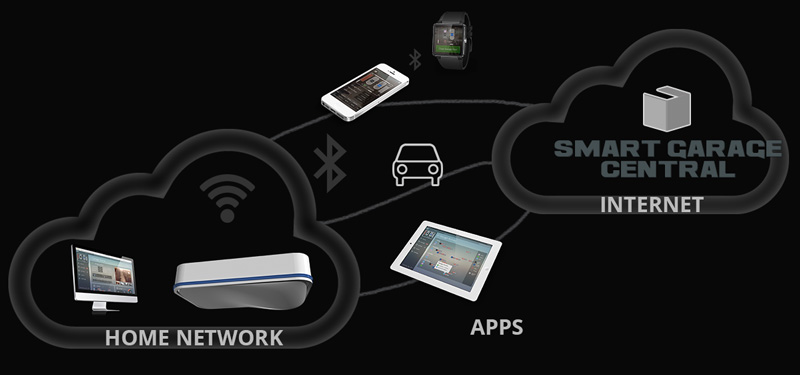
Base Station Architecture
Inputs
- The power cables of up to 3 garage door openers can be plugged into it
- Optionally, connections to the garage and front lights could be inserted
- Optionally, connections to accessories for controlling the side and house doors could be inserted
- A/C power cable (perhaps more than one)
- Inside the base station would be:
- Short-range IP 360 degree camera
- A decent microphone
- Environmental Sensors, such as:
- Temperature
- Moisture
- Chemicals (e.g. smoke, CO, gas)
Outputs
- Some LEDs for visual communications
- Decent speakers
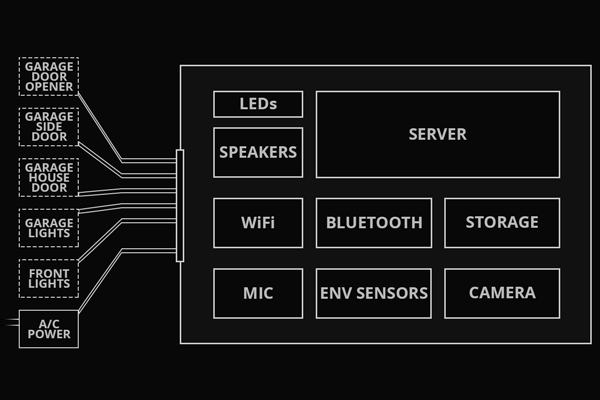
Processing
- Inside the base station would be a server that connects to the Internet through your home Wifi network
- This requires a CPU, some storage (e.g. flash), and a Wifi chip
- A Bluetooth chip is also needed for communicating with other devices (e.g. phones)
- A programmable RF transmitter is also needed for controlling the garage door openers
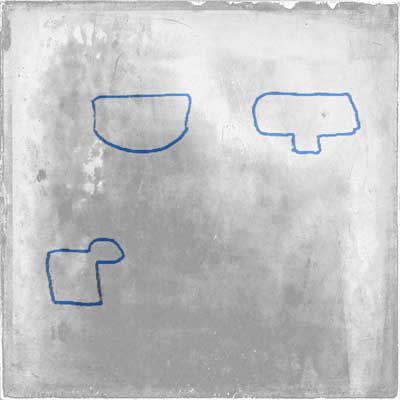
Shape Concepts

Contour Ideas

Multiview Sketches
The location of the camera played an important role in identifying the overall shape of the base station.
Overall, I wanted to create an industrial design that was aesthetic, minimal and yet carried forward the “friendly” design language that should be characteristic of this product. This is seen in part with the smooth contours, light colors, and avoidance of it appearing as an (unfriendly) security camera.
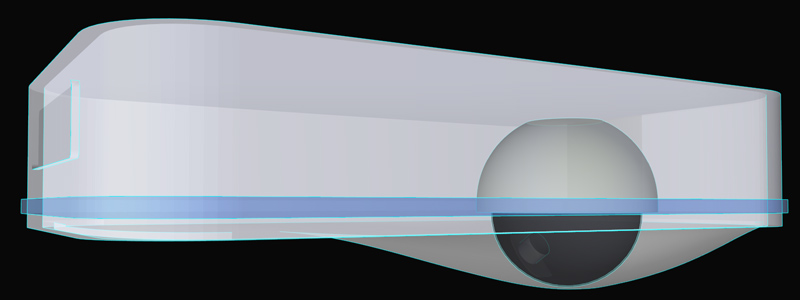
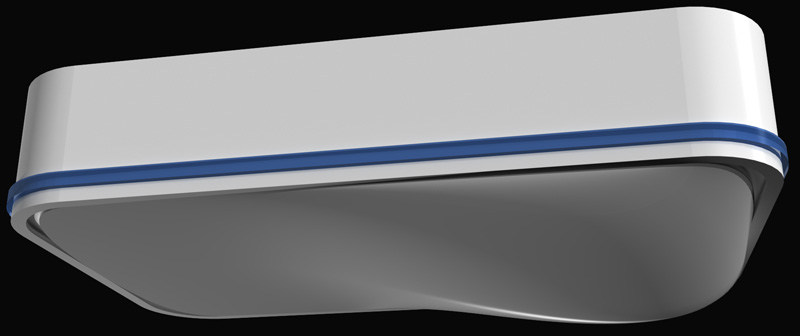

The camera would see through the curved plastic window, which would be coated with aluminum oxide to act as a one-way mirror (you couldn’t see the camera, but it could see you).
The semi-gloss plastic body housing would have a semi-transparent acrylic band encircling it that would function as a light pipe for the LEDs.
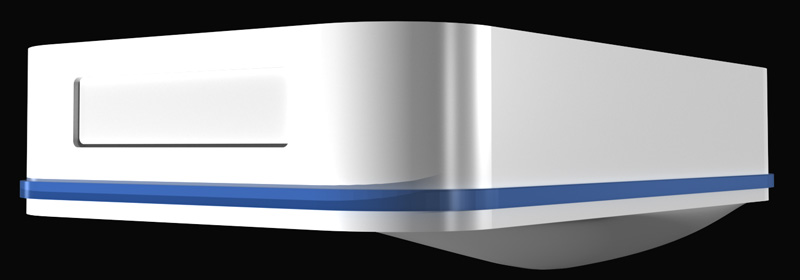
The recessed connection panel would collect the various connection in one place, keeping the wire paths organized across the ceiling of the garage.
Dashboard Sitemap
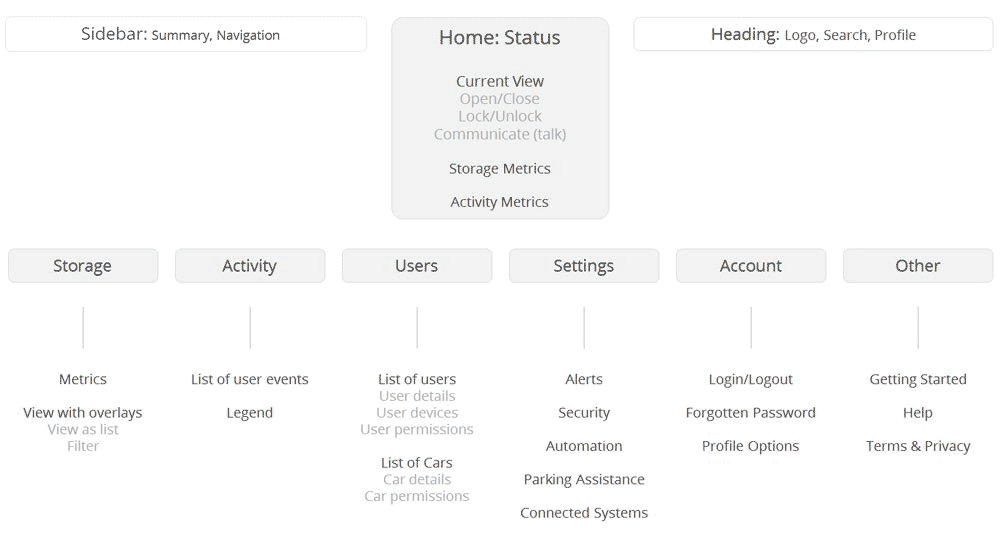
Garage Status
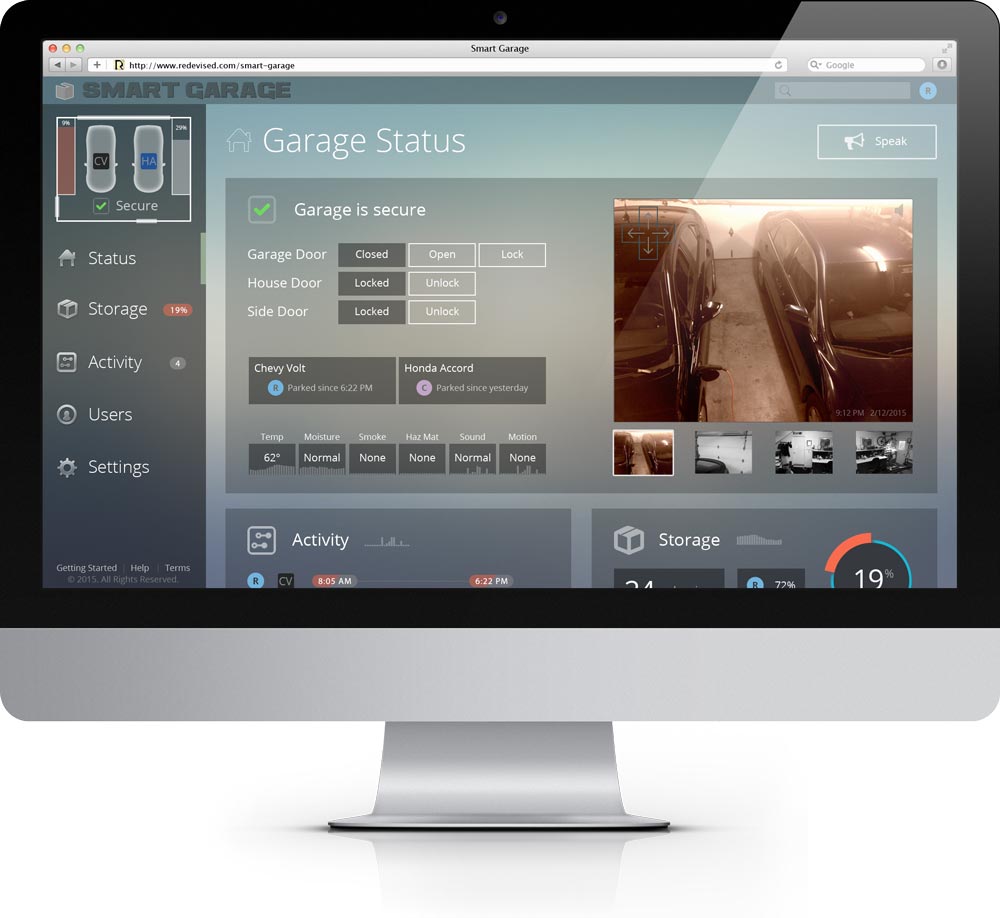
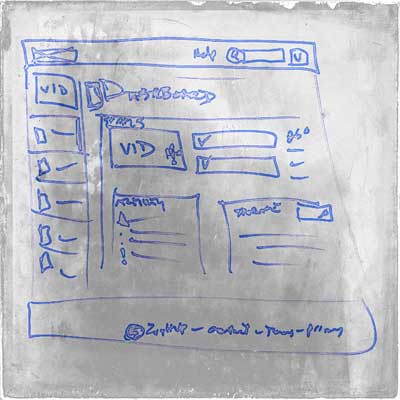
The Dashboard’s Status page functions as its homepage for logged in users. At a glance, it provides:
- Security status of all entry points
- Status of cars
- Current environment monitoring status
- Primary storage metrics
- Primary activity metrics
Garage Storage
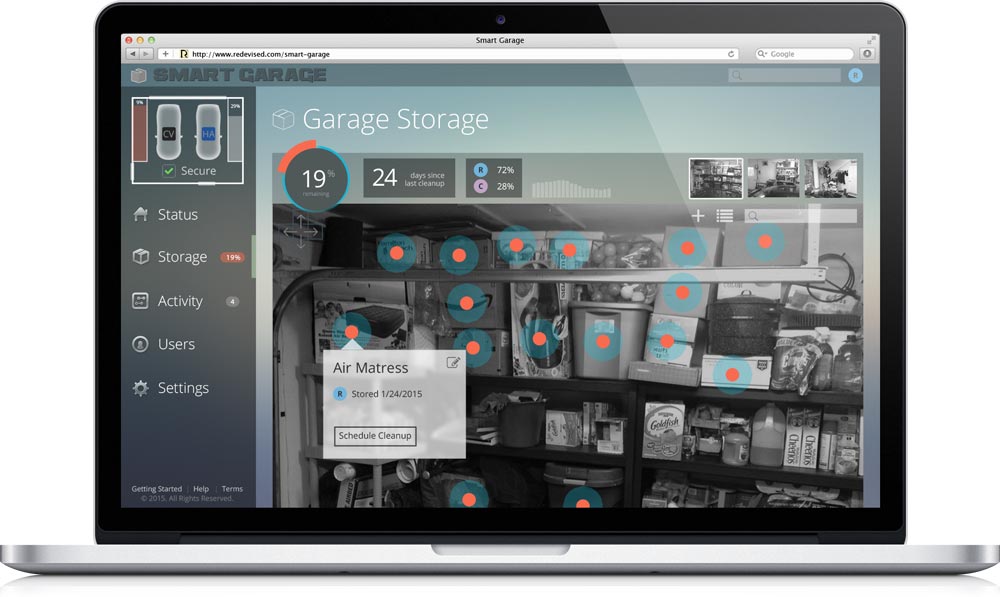

The Dashboard’s Storage page provides a graphical view of where things are stored in the garage. Some benefits include:
- Not having to be in the garage to find things
- Able to see not only what is stored, but by/for whom
- Be reminded to cleanup
- Be alerted when space is running out
Garage Activity
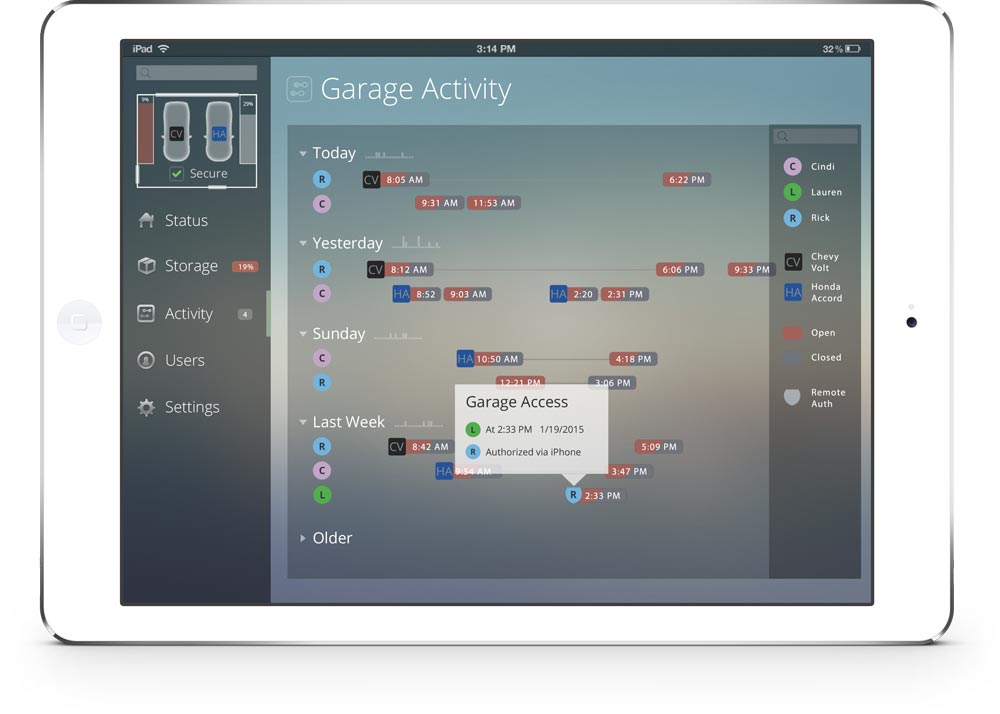

The Dashboard’s Activity page provides a graphical representation of the garage’s recorded events. The hierarchy of information is:
- Relative Time (day event started in relationship to today)
- User (who was the actor of the event, if known)
- Car (if used as vehicle for garage access)
Other Pages

Users
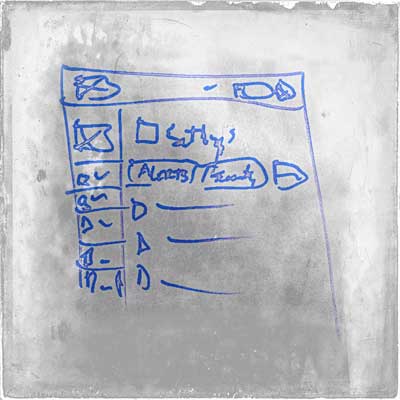
Settings

Status

Activity
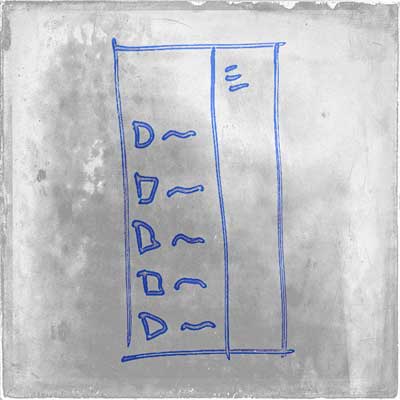
Menu
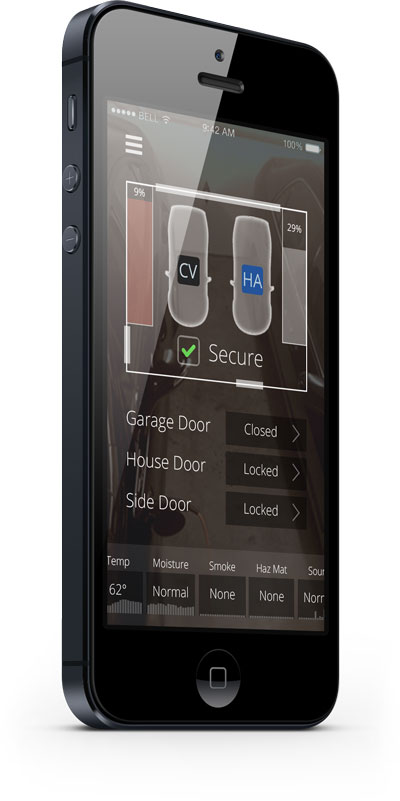

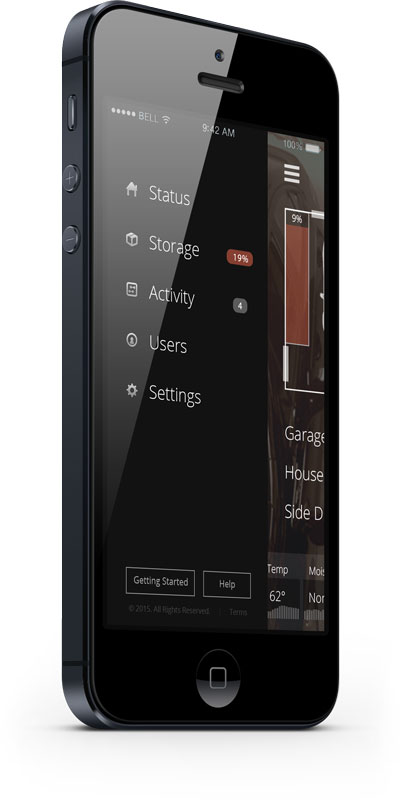
The smartwatch has the benefit of being a slightly more convenient interface for simple interactions because you do not need to retrieve (and unlock) your phone.
Some examples of how the smartwatch app could be used with the Smart Garage include:
- Display notifications with ability to take action
- The garage was left open
- Someone is requesting access
- Attempt was made to open garage outside expected times
- Dangerous temperature level (fire, pipes freezing)
- Dangerous gases (CO, natural gas leak, etc.)
- Time to spring clean (reminders, storage % full)
- View garage status (e.g. is the door closed?)
- Allow you to open/close garage
Most other functions are best left to the smartphone app because of the phone’s higher processing power and larger display.
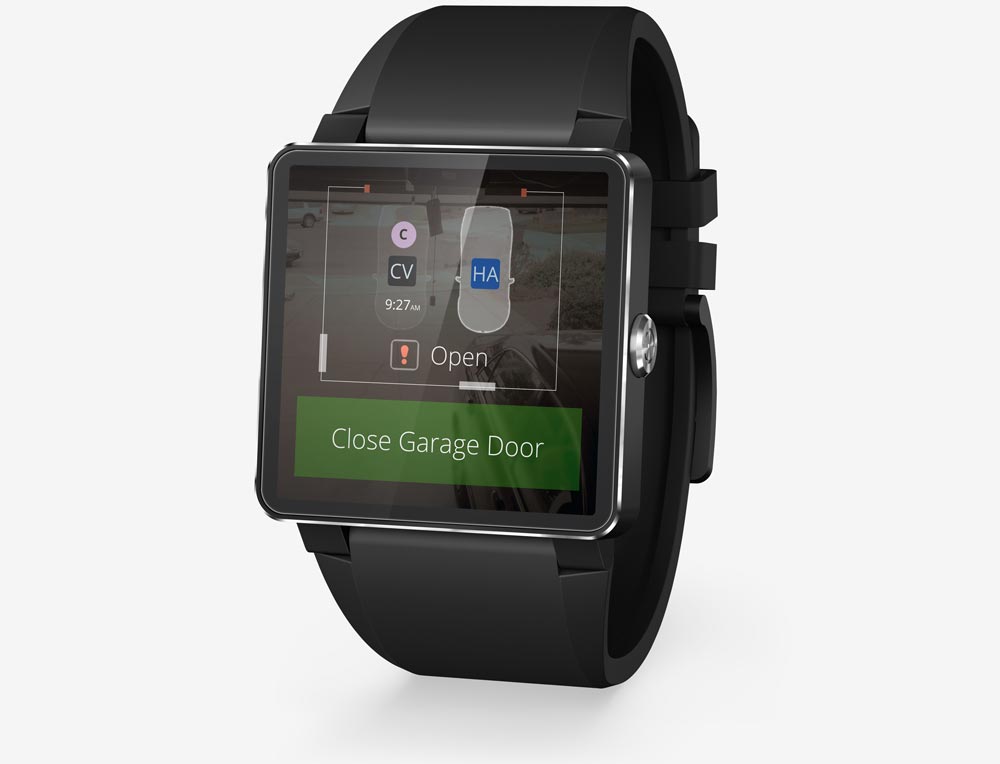
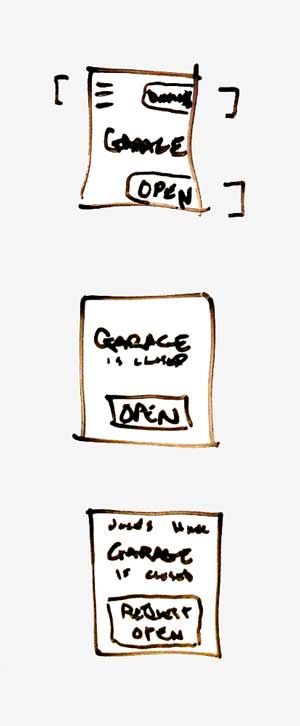
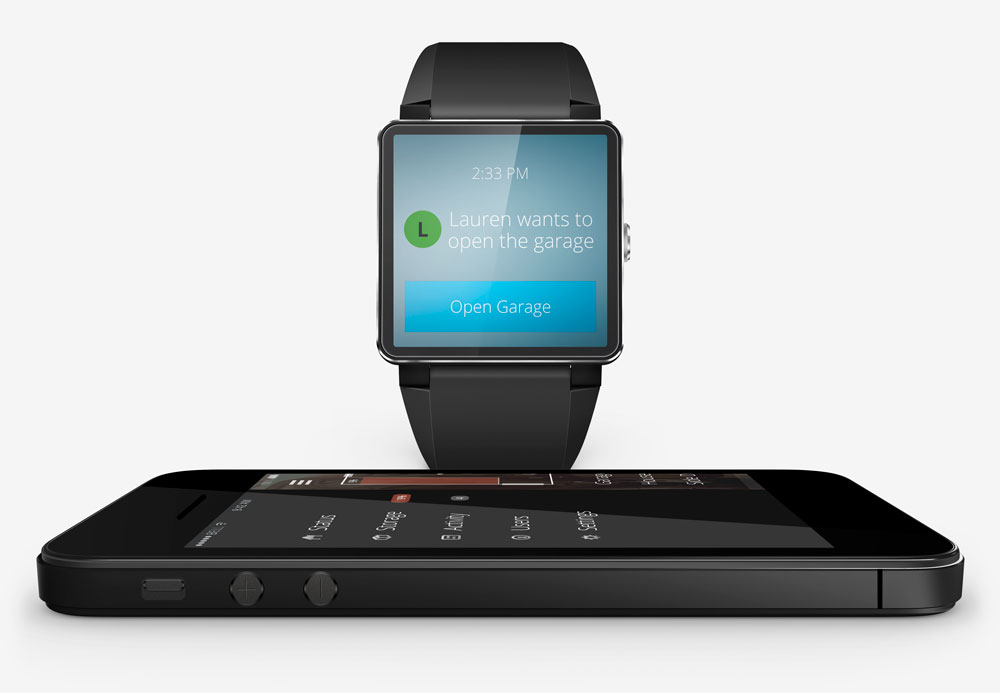

Some accessories for the Smart Garage could be:
Electronic Door Bolt Lock
- Can protect the house by ensuring the door is locked
- For use with house and/or side doors
- Would connect and be controlled by the Smart Garage
Manual Pad Entry
- Allows you to open the garage from outside without a smartphone
- Keypad and/or biometric with wiring to connect to Smart Garage
Additional Sensors
- Sensors that are important to some homes (radon detection, radiation, etc.)
Chainable Lights
- Lights that can be installed in the garage or out front and are controlled by the Smart Garage
- Connect into the base station
Light Wiring Converter Kit
- Enables you to easily connect standard house wiring to the light connection ports of the base station
Mounting Rack
- Allows you to easily install the base station to the garage ceiling
- Included with base station
There are a number of ways you could go to market with this product. The highest likelihood of success would be to whitelabel it under a brand that already has massive distribution reach.
However, with the level of design attention and perceived “innovation” put into this product, it would be interesting to create a brand and bring it to market. This would likely mean selling it through two-tiered distribution, as well as direct online.
Cost-Plus Pricing
BOM Analysis
| Component | Estimated Cost |
|---|---|
| Camera | $20 |
| Sensors | $15 |
| Speakers | $10 |
| Wifi Chip | $10 |
| Bluetooth Chip | $10 |
| PCB + CPU | $10 |
| Housing + Assembly | $10 |
| Microphone | $5 |
| Flash Storage + LEDs + RF Transmitter | $5 |
| Packaging + Packout | $5 |
| TOTAL | ~$100 |
Details
This BOM analysis is a “back of the napkin” exercise, validated with just a bit of Googling.
I’m sure I’m missing something, but hopefully the main things are accounted for and the costs are not wildly inaccurate.
Gross Margin
Assuming a two-tier distribution model, a slim gross margin for this type of product (25%) could be achieved at a $250 pricepoint, an acceptable level (50%) at $299, and a healthy level (100%) at $399.
This does not take into account future price erosion, but having a recurring revenue stream for the Dashboard’s cloud services helps offset the gross margins and could justify a lower hardware pricepoint. Ultimately, I’d want to push as much of the revenue generation onto the subscription, even if it just meant selling the hardware at a price that covers its costs.
Value-Based Pricing
Doing some value-based pricing analysis would take some time, but in the interest of this concept, I’d compare this product with the Nest Thermostat. Though in an adjacent market, that product commands a perceived value from its customers that justifies a $250 list price.
Assuming a similar level of value is seen in the Smart Garage, entering the market at a similar pricepoint as Nest could mean that the pricing is not far off optimal on the price curve.
Price Optics
If the growth strategy is geared toward maximizing ARR (annual recurring revenue) through paid subscribers, it makes sense to have a good-better-best product pricing strategy. By offering a (lower cost) entry-level hardware product at a lower price, you are better positioned to hit perceived consumer pricepoints and increase subscribers you would have otherwise missed. This also has the benefit of providing a hardware upgrade path for very satisfied customers.
Base Station
$ 299
One-Time- Includes first year of the Dashboard Cloud Services
Dashboard
$ 9
Per Month- First year included with purchase of Base Station
Accessories
$ +
Add-on Price- Hardware accessories as well as SaaS add-ons
There are so many ways to grow this type of business.
From a product perspective I would focus predominantly on adding value through the cloud services, likely best achieved by strategic partnership with home security providers (OEM products, cross-sell), as well as other integration partners.
For market penetration, I would look to strengthen and broaden the sales channel (e.g. distribution partners), as well as develop new markets in other geographic regions.
Additionally, this product is part of the IoT (Internet of Things) wave, and the data itself has value in the broader marketplace for further improving the user’s experience and driving more user value. More thought could go into:
- Platform Capabilities: Opening APIs to foster interconnection of other devices and web services
- Data Mining of both gathered data (sensors, activity, etc.) and 3rd party data (e.g. crime reports, weather, social networks, etc.)
- Energy Patterns (look both outside and inside for ways to conserve)
I would like to no longer wonder if I left the garage door open. Too often I’m discovering things stored in my garage I didn’t even know were there. I’m embarrassed to say I have been locked out of my house more than once. I could really use a Smart Garage, and it would consolidate a number of devices for me.
Most products should aim to be essentially invisible to us. But sometimes by taking an overlooked and all-to-common product and infusing it with a burst of technology and extreme design attention, you arrive at a product that would not naturally have occurred in the market, but looking back, it seems that it obviously should have been. Every product can be improved, and I wouldn’t call this “innovation”; it’s just that it has been redevised.

